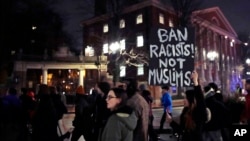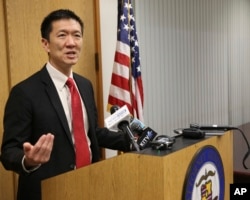Six U.S. states are challenging President Donald Trump's revised executive order that bars new visas for people from six predominantly Muslim countries and temporarily shuts down the U.S. refugee program.
The state of Hawaii already has filed suit, arguing the new federal order will harm Muslims living in the Pacific island state. Five other states have banded together in a combined challenge to the latest order from Trump, meant to replace an earlier decree that was overturned by U.S. courts.
The West Coast state of Washington, which played a leading role in resisting the original presidential order, asked a federal judge in Seattle to affirm that a court order suspending enforcement of Trump's January 27 edict also applies to the new version released by the White House.
The states of Oregon, Minnesota and New York have joined Washington state's legal action, and Massachusetts announced late Thursday that it, too, will take part when an amended complaint is filed next week.
Bob Ferguson, Washington state's attorney general, said the states have a solid legal argument. The president's new immigration order is "narrower" than the original version, Ferguson said, but "that does not mean that it's cured its constitutional problems."
New order to take effect March 16
Trump signed a new executive order Monday barring citizens from six countries -- Iran, Libya, Somalia, Sudan, Syria and Yemen -- from traveling to the United States for three months, and suspended for four months a U.S. refugee resettlement program.
Foreign travelers who received visas to the United States before January 22, or who already are legal permanent residents of the U.S., are exempted from the new order.
A federal judge will hold a hearing on Hawaii's lawsuit on March 15, one day before the new ban is to take effect.
The revised order removed Iraq from the list of countries whose nationals were to be barred from entering the United States, and also clarified the exempt status of "green card" holders -- legal permanent residents.
Airport chaos moved into court
The original immigration order issued January 27 led to chaos and confusion at airports across the U.S.
All travelers from seven Muslim-majority countries were affected, either detained for prolonged periods or sent back on return flights to their home countries.
Crowds of protesters gathered at many airports demanding that would-be immigrants be allowed into the U.S. and many volunteer attorneys came out seeking to represent foreign detainees.
Customs and border patrol agents who apparently had little time to prepare for the immigration action carried out the president's order unevenly in different cities, and dozens of legal challenges were mounted in courts across the country.
Days of chaos ended only when a federal appellate court on the West Coast issued a temporary order preventing enforcement of the travel ban.
The Department of Justice in Washington argued against the temporary order, but was overruled by the court, and the original restraining order still is in effect. However, White House spokesman Sean Spicer said Thursday that the Trump administration is "very confident" the new travel ban will withstand legal challenges.
Steve Herman at the White House and Ken Bredemeier contributed to this report.





